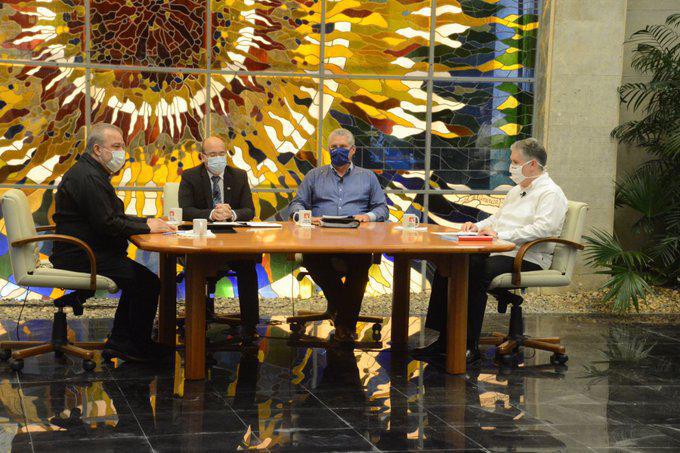Three months after the first cases of COVID-19 were reported in Cuba, as the recovery phase is about to begin, President Miguel Díaz-Canel Bermúdez insisted that we must “continue to work responsibly, convinced that we can control the pandemic and avoid new outbreaks.”
Speaking June 11, on the Mesa Redonda television program, to present plans for the first stage of post-COVID-19 recovery period, conceived in three phases, he stated that the better the results, the faster we will reach normality.
He added that, as a possible prognosis, the first stage could begin during the week of June 14 or early the following week.
But this victory, he said, will only be solid and permanent if we understand that the next steps will demand the same discipline, dedication and effort evident in the battle thus far, and that the return to a new normality will be gradual and carefully controlled.
During his presentation, the President stated that current statistics are encouraging. Leaving aside a few adverse events which occurred recently, he noted, the numbers of new cases and hospitalized patients are decreasing. He added that the few deaths recorded over several consecutive days, and the reduced number of patients in serious and critical condition, indicate that our therapeutic protocols, developed with the contributions of Cuban science and biotechnology, are effective.
Díaz-Canel pointed out that work has been done on an economic and social strategy in two stages, to confront the acute crisis that the epidemic has caused worldwide.
The first will involve gradually returning to normal in all the country’s productive, economic and social activities. The second will involve strengthening the economy to deal with the prolonged crisis at the global level.
With a view toward preventing COVID-19 from becoming endemic, he emphasized the strength of Cuba’s public health system, forged in the Revolution, which has managed to eliminate 14 infectious diseases and control nine others. “We are in a position to control the disease,” he said.
Regarding the measures to come, he said they will be implemented in a gradual, differentiated manner, since all areas of the country do not face the same situation. According to mathematical and epidemiological models, Havana is currently the epicenter of the epidemic and will be the “tail end.” Thus, the capital will not reach different phases as soon as other municipalities and provinces.
Photo: Estudios Revolución
The President noted that many of the 500 measures implemented in the current stage of the epidemic, which have produced positive results, will be maintained in the coming period. These include:
-Maintain conservation as a basic premise.
-Resume restrictive measures if any reoccurrence or transmission event should occur.
-Resume all productive and service activities, with limitations.
-Use of facemasks is a preventative measure that must be maintained, especially in public places, along with medical masks, which will not be eliminated.
-Maintain frequent hand washing and other hygiene and disinfection recommendations.
-Continue active community surveys to identify possible cases of infection.
-Avoid outdoor activities with high concentrations of persons, and especially those indoors.
-Maintain regulations regarding transportation and mobility of the population.
-Provide personalized and prioritized attention to the most vulnerable families.
-Assume physical distancing as a rule.
-Continue to protect health personnel.
-Increase and improve home services and electronic commerce.
-Open tourism with a series of well-defined limitations, first domestically and later internationally, with careful monitoring of visitors health.
-Take advantage of new export opportunities in the pharmaceutical and medical services area.
-Improve the collection and distribution of basic products for the population
-Strengthen the participation of science and continue research, especially the five Cuban vaccine candidates.
-Maintain the fight against corruption and illegalities.
The President also recommended an assessment of results produced by these measures during the recovery phase, and the application of this experience in risk reduction plans for confronting epidemics, and, when conditions exist, in exercises to prepare for the hurricane season.
Photo: Estudios Revolución
RE-OPENING TOURISM
-In a first stage only local tourism will be allowed.
-International tourism will begin in the second stage, and will be limited to the northern and southern keys of the country. Depending on the demand, Santa María, Coco, Guillermo, Cruz and Largo del Sur Keys will be opened. Excursions to cities or other sites will not be offered. These vacation packages will not be available to national customers during the first phase.
-All international visitors will be administered a PCR test for the new coronavirus and have their temperature taken, upon arrival in the country.
-Clinical epidemiological surveillance will be conducted within hotels. In the event that a tourist tests positive, he or she will be hospitalized immediately.
-Workers in the sector will be given a rapid test upon arrival at the hotel where they work.
-Those providing services for the first international tourists will remain onsite at the hotel for seven days at a time, followed by seven days of isolation in their homes, under observation by their primary care physicians.
2021 ECONOMIC PLAN IN THE WORKS
Alejandro Gil Fernández, Deputy Prime Minister and Minister of Economy and Planning, began his presentation noting the severe impact of the epidemic on the world economy.
Although it is not yet possible to assess all the damage, he said, contractions in developed countries and increasing poverty in Latin America and other regions are clearly evident. “Of course, Cuba is also subject to these factors,” he stated.
To implement measures for each of the recovery to put the country on the road to a new normal, the Economy Minister explained that a strategy marked by several elements has been designed.
First, to adjust the Economy Plan for the current year under the premise of not accommodating it to the new context, but rather imposing our priorities. To this end, maintaining exports in the sectors that have not been paralyzed is a key point.
He stressed that work is already underway on the 2021 Economy Plan. The strategy created to face a prolonged crisis requires the redesign of many elements, he said, among them he mentioned strengthening savings, generating more income in foreign currency, using the country’s resources more efficiently, defending exports and national production. He confirmed that food production is a prime priority.
“Faced with the new context, we need an innovative, bold strategy that can find ways to deeply transform the economy and allow us to successfully impose our priorities successfully. The idea is not only to survive, but to continue development.”
Source: Granma International.






































